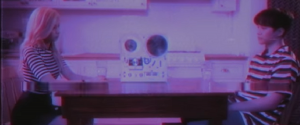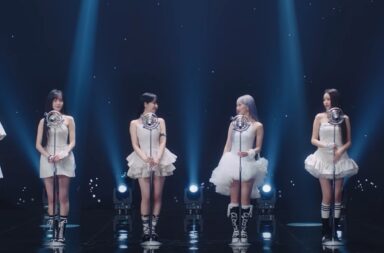
2PM’s Junho’s first Korean comeback in years has been hyped with weeks of teasers and images and the buzz has been considerable. When the double title tracks, “Canvas” and “Instant Love” dropped, they had a markedly different style to the upbeat, tropical trends that have been dominating current releases. To some, the mood switch may read as lackadaisical; however, both tracks have interesting influences, executed to differing degrees of success.
“Canvas”, the title track of the album, was given first billing during promotions for Junho’s comeback and is a mid-tempo, ambient electronic song paired with a suitably minimalist MV. There is very little plot to the “Canvas” video, it mainly shows Junho alone passing through urban and desert landscapes. He is also seen brooding in an empty hotel room. Visual interest is maintained with the use of lens distortions, trippy colour changes, and dissolving transitions between scenes.
On one of his V Live broadcasts, Junho explained, “The title song is called ‘Canvas’ and is about a man who lacks inspiration and is tired of his daily life. One day he meets a woman and the blank page of his heart is filled up. The song is full of various different colors. I’m not really sure how I should explain the song, but I do hope you listen to it and judge for yourself.”
He describes the song as somewhat ephemeral but it explicitly draws from aspects of vaporwave and J-pop to musically and visually illustrate isolation. “Canvas” lyrically describes the influence of a lover that brings the protagonist to a point of emotional fulfillment but the visuals present Junho as solitary and restrained until the final scenes.
If I didn’t have you
I would’ve been an emotionless, blank sheet of paper
But you color my heart
 Swirling camera angles dissolve between empty cityscapes and uninhabited wilderness emphasising his alienation. He’s shown walking or driving as the colours shimmer between desaturated shades and muted neons. This draws attention to his restlessness and positions the viewer in a world disconnected from reality. It’s light on narrative, but rather advances a mood of loneliness and dream-like abstraction.
Swirling camera angles dissolve between empty cityscapes and uninhabited wilderness emphasising his alienation. He’s shown walking or driving as the colours shimmer between desaturated shades and muted neons. This draws attention to his restlessness and positions the viewer in a world disconnected from reality. It’s light on narrative, but rather advances a mood of loneliness and dream-like abstraction.
The song and its performance are similarly separated from the lyrical content. Junho’s vocals are purposefully smooth and there’s little variation in energy between the verses and chorus. The climax of the song is the instrumental breakdown towards the end that is punctuated with an emotional dance scene in the MV but it’s not a dramatic shift. The song plays to the sounds of late night background music but doesn’t push within its lo-fi boundaries far enough to be exciting. “Canvas” has a hazy groove that’s appealing, particularly upon repeat listening but it’s position as a lead single is slightly underwhelming given its chill vibe.
“Instant Love” is bolder in composition and production. The MV also more overtly plays to its vaporwave influences in tone and execution. The pink and teal lighting interspersed with handheld style video footage and retro styling has a plainly 80’s reference point. It’s unapologetically nostalgic even in the way Twice’s Sana and Junho are directed in their interactions which are stiffly composed to convey their emotional distance.
Echo-heavy vocals over the thumping bass and occasional distorted, down shifted alibs give “Instant Love” a more dynamic sound. It’s not as easy listening as “Canvas,” but the referential style works better when fully embraced. The song explores the ending of a tumultuous relationship where the protagonist reminisces and wants his love to return.
When I am looking at youIt’s like looking at a film on pauseYour pitch black eyes (No)And frowning faceDoesn’t even talkAbout those times we happily laughedBefore everything went wrong
 The MV again does not present a linear storyline but instead creates a mood to accompany the song. Sana and Junho are shown together but their interactions are stilted apart from when she tries to turn him towards her. That moment represents a turning point as the music enters the breakdown. As greater distortions are introduced sonically, the visuals become more chaotic and once the breakdown is over the MV returns to its lounging romanticism. The combination of the artificiality of the poses, the kitsch visual choices, and the electronic production is cinematically and creatively articulate.
The MV again does not present a linear storyline but instead creates a mood to accompany the song. Sana and Junho are shown together but their interactions are stilted apart from when she tries to turn him towards her. That moment represents a turning point as the music enters the breakdown. As greater distortions are introduced sonically, the visuals become more chaotic and once the breakdown is over the MV returns to its lounging romanticism. The combination of the artificiality of the poses, the kitsch visual choices, and the electronic production is cinematically and creatively articulate.
(Youtube, NUBI Magazine, Dummy Mag. Lyrics via Pop!Gasa, Lyrics Translate. Images via JYP Entertainment)


